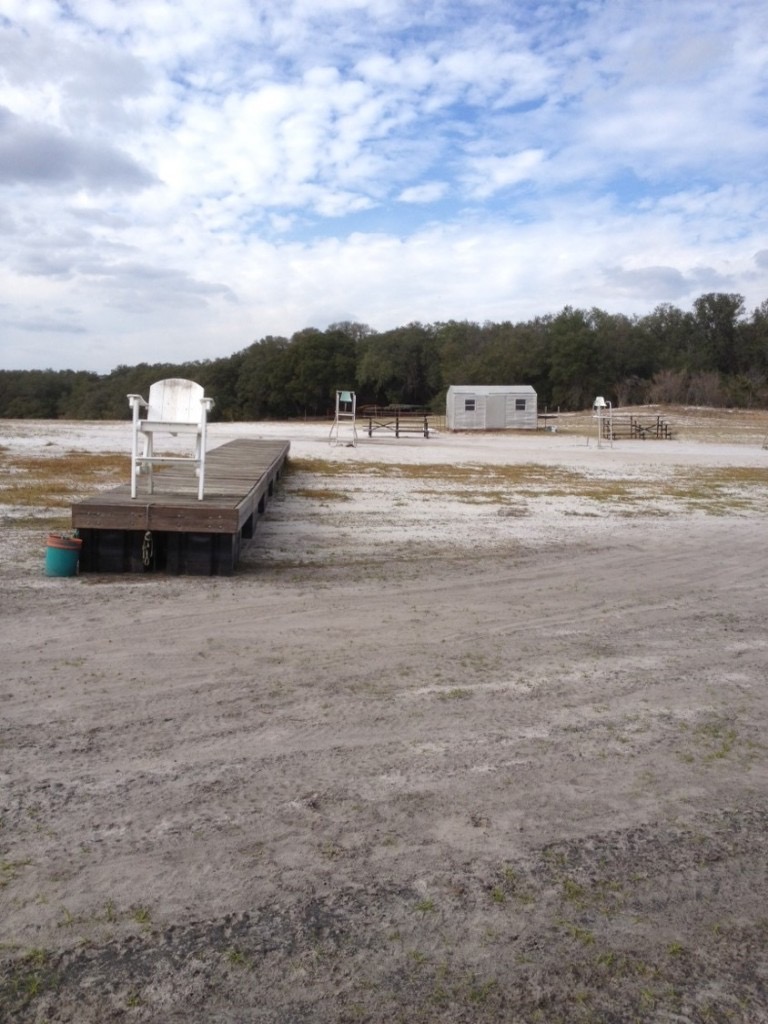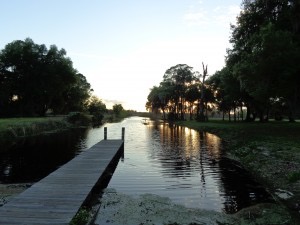
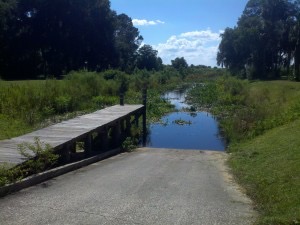
Business has picked up in the Cross Creek area in the past few weeks thanks to heavy rainfall during the first three months of this year. Lake levels are up in Orange and Lochloosa Lakes in Alachua County resulting in more boat traffic in recent weeks. People are fishing and airboating once again.
For many months boaters couldn’t navigate Cross Creek to get in to either lake because of dense plant growth due to low rainfall. According to the St. John’s River Water Management District, Alachua County received 14.28 inches of rain between January 1st and March 18th. That’s 11.33 inches more than the same period last year. The Keystone Heights area has received 14.35 inches since January 1st, which is 12.02 inches more than the same period last year.
Local residents in Cross Creek say that in the past week they observed the Florida Game and Fresh Water Fish Commission releasing 125,000 fingerling bass in Orange Lake. Area residents are calling this a positive move to help recreational fishing for the near future.
Original Story in September, 2013
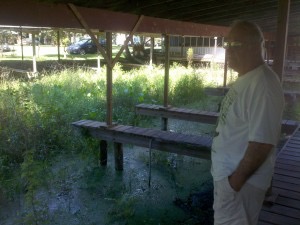
By Donna Green-Townsend and Amanda Jackson
Cross Creek Lodge once catered to fishermen, hunters, and people with a love for the great outdoors. But with lake levels staying low for many years it seems the lodge will never thrive as it did in the past. Owner and operator of the Cross Creek Lodge Gary Palmeter opened the doors to his business, which sits on the creek between Orange and Lochloosa Lakes, more than three decades ago. With lake levels constantly rising and falling he has only been able to operate for 12 of the 33 years he’s been in business. (Video below includes interviews with Dale Crider on Newnans Lake and with Gary Palmeter on the Cross Creek area)
“I’m losing a lot of money every year, we used to have a cafe, that’s gone,” says Gary Palmeter, “Had we had enough water we could have probably maintained that. If the state would do something about the hunter permits that they allow people to use we could have hunters here. Right now we have hunters, a few of them for maybe like 2 months. We used to have a number of people that stayed here through the hunting season, but if they don’t get a permit, which is a lottery type thing, they don’t come. That’s a loss to not only the community but the county because that’s tourist dollars, out the window!”
Palmeter says he feels there’s more to this problem than just rain. A sinkhole under Orange Lake, which is a major source of contention between Marion and Alachua counties, is also thought to be draining a large amount of water from the lake.
“So that’s you know the crux of the problem besides the rain. I mean yeah, we get water levels and I understand that we’re not going to maintain a high level, but with the water continually flowing out of the lakes there’s nothing that’s ever going to be done to help stabilize them.”

But for those who think that large amounts of rain that accompany Florida summers can refill the extremely low lakes, Palmeter knows the reprieve is only temporary.
“Even when we got the two hurricanes that came late in 2004 if I remember right, that water only held for 18 months. It was up sufficiently so that we could have boats here launch. We had boat and motor rentals again. And we’re not going to go through that again I don’t think.”
For now, boats slips at the Cross Creek Lodge are filled with grass instead of boats. Other local businesses have been suffering as well. Although it is still open for business, the Yearling Restaurant in Cross Creek, is up for sale. With continued limited lake access Palmeter says its hard to keep these businesses running.

“We still keep the motel going and we try to keep the campground going the best we can, but the motel hasn’t done anything because most of the people that want to come here to stay are fishermen. The first thing when they call I explain the situation. And I like to be up front with people, and as a result it probably in some way hurts our business. But I kept thinking in the long term it would improve but it hasn’t. We’ve lost our base of business, the fishermen that used to come here. They call and sometimes want to bring their son to where they used to fish. Well, they can’t do that anymore. So you’ve really lost your whole base of business.”
Alachua County Environmental Protection Director Chris Bird says that no matter how much it has been debated over the past 50 years there isn’t anything that can be done to the Orange Lake sinkhole without causing even more damage.
“The geology of that lake is such that if you did try to plug them up, the sinks in the bottom of the lake, assuming you thought it was a good idea, most likely what would happen is that there would just be other sinks that would open up other places because there’s just a lot of pressure,” says Bird. “And the way that system naturally flows is that actually the southern part of Orange Lake is recharge. They’ve actually done dive trace studies that suggest that that water is draining back into the aquifer. And it’s part of the Silver springshed, so again, there’s just a lot of important relationships. And because of that, at least in my opinion, it would not be wise to start trying to mess with mother nature.”
To see a music video highlighting lake levels click below:
Orange and Lochloosa lakes are not the only lakes experiencing low levels in Alachua County. Newnans Lake has also felt these water fluctuations. Retired wetlands and wildlife biologist for the Florida Fish and Wildlife Conservation Commission Dale Crider has seen the level changes while living by the lake. Crider says the situation is not much different from the water level issues in Keystone Heights.
“I think it’s like most north Florida lakes that it’s tied in to the Floridan aquifer which is overpumped and underfed right now because we’re not getting the rains we used to,” says Crider, “and it’s overpumped from all sources from municipal to agriculture to you name it. It seems like there’s such a capacity for this water to be soaked up and disappear through sinkholes and underground terrain. You know there’s not this capacity to fill up the aquifer so that it bubbles above the surface anymore.”
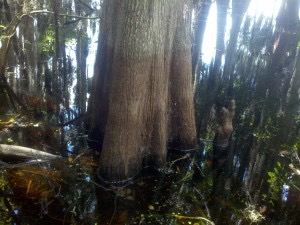
Crider pointed to a tree where the water level line was three weeks ago which showed how far it had decreased in a short time. He says it demonstrates the lakes still aren’t healthy
“There’s still this suction kind of thing and I don’t think this flood that we’ve had made that big of an impression for that long that it would have filled up the aquifer to where we can go back to using water normally. I don’t think we’ll ever reach that point where what we used to call normal use of water for watering our lawn or just filling our swimming pool more frequently or whatever we do with it, I think those days are past.”
Something Crider and Palmeter both agree on is that county officials and water regulators will need to do a better job of overseeing Florida’s water resources.
